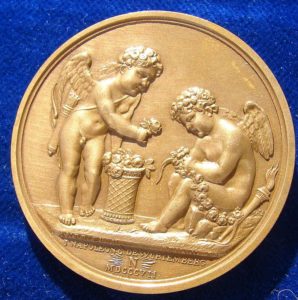
Pink gilia in Sequoia National Park in June
Come to think of it, Procrastination is not a bad title for a pseudo Jane Austen novel, is it? Starting a fashion for one word titles with her own Persuasion, Jane Austen also wrote to her niece Anna, approving of the one-word title of her work in progress, Enthusiasm. She wrote, “Enthusiasm is such an excellent title, nothing could surpass it!” So perhaps she might also have approved of Procrastination as a title. Imagine her writing a novel about two enchanting young people (like Darcy and Lizzy or Henry and Catherine), who would of course end up at the altar, after a great many problems due to that abiding fault, Procrastination. The procrastinating character (or procrastinatress) would learn a lesson, with the result of wedding bells.
But I am not writing that novel, nor did Jane Austen, who clearly suffered not in the slightest from the fault of procrastination, or she could never have written the six masterpieces she did in her brief 41-year-life span. Rather, our group’s theme for the merry month of May was “Any Excuse Will Do.” And where was my contribution? Perhaps I am unnecessarily bringing my failing to your attention, but I admit it did not appear. My excuse is that I was virtuously bogged down in writing my talk and playlet for the JASNA AGM meeting this fall. This will take place in Victoria, BC on September 30 – October 2, and I’m planning to be there with bells on (or at least a bonnet). On that occasion, no procrastination will be allowed, especially after I have bought the plane ticket! (But I haven’t done that yet. Oh, no need. Plenty of time for that…why hurry…)
Since there can be no more eloquent testimony to Procrastination than to write a May post in June, that is what I am doing today. Therefore I present to you some Jane Austen quotes for May, decorated with a few flower pictures from the brief trip my husband Peter and I took to Sequoia National Park last weekend, to enjoy the spring wildflowers (when I should have been writing).

Flowers in June, Sequoia National Park
Here is a snippet from Emma, in which Mrs. Elton is telling Mr. Weston about her courtship, which has resulted in the former Augusta Hawkins marrying Mr. Philip Elton, and coming to Highbury to become a perennial thorn in Emma’s side:
Mr. Weston: “I have observed, Mrs. Elton, in the course of my life, that if things are going untowardly one month, they are sure to mend the next.”
Mrs. Elton: “Very true, Mr. Weston, perfectly true. It is just what I used to say to a certain gentleman in company in the days of courtship, when, because things did not go quite right, did not proceed with all the rapidity which suited his feelings, he was apt to be in despair, and exclaim that he was sure at this rate it would be May before Hymen’s saffron robe would be put on for us! Oh! the pains I have been at to dispel those gloomy ideas and give him cheerfuller views! The carriage — we had disappointments about the carriage; — one morning, I remember, he came to me quite in despair.”
She was stopped by a slight fit of coughing, and Mr. Weston instantly seized the opportunity of going on.
“You were mentioning May. May is the very month which Mrs. Churchill is ordered, or has ordered herself, to spend in some warmer place than Enscombe — in short, to spend in London; so that we have the agreeable prospect of frequent visits from Frank the whole spring — precisely the season of the year which one should have chosen for it: days almost at the longest; weather genial and pleasant, always inviting one out, and never too hot for exercise. When he was here before, we made the best of it; but there was a good deal of wet, damp, cheerless weather; there always is in February, you know, and we could not do half that we intended. Now will be the time. This will be complete enjoyment; and I do not know, Mrs. Elton, whether the uncertainty of our meetings, the sort of constant expectation there will be of his coming in to-day or to-morrow, and at any hour, may not be more friendly to happiness than having him actually in the house. I think it is so. I think it is the state of mind which gives most spirit and delight.”
Now, there is a pleasant panegyric to May, and I am very glad to have revisited this paragraph and seen it again. That is exactly how it is with Jane Austen; if you pinpoint almost any particular paragraph, you will find something to delight you anew. And it will always be a pleasure, in thinking of May weather, to remember Mr. Weston’s enthusiastic praise of it.

But my Gentle Reader reminds me, chiding gently as she is wont to do, that we are now having June weather. True, so it is; but this is still my May post and I will stick to it. The best way to do that, I think, will be to clear up the matter of Hymen’s Saffron Robe, which Mrs. Elton alludes to, above. As you may be aware, I have written a short novel about Mrs. Elton. It was my very first published piece of Austeniana, and it was the conference gift of the 1999 JASNA AGM in Colorado Springs. This indicates my long history of participating in JASNA conferences! My story, In Defense of Mrs. Elton, was illustrated by Juliet McMaster, and JASNA put it up on their website on their Publications page, where you can always read it, for free. Here is the link:
https://jasna.org/publications/defense/index.htm
Despite having studied Mrs. Elton exhaustively for years (a perfectly respectable hobby for an Austen Variations author, I assure you), rereading the above paragraph today highlighted something I hadn’t really pondered about before. This is Mrs. Elton’s habit of making allusions to literary productions, which is clearly intended to impress and to make herself appear high toned. It’s especially funny since she sometimes makes mistakes. For instance, here she quotes Thomas Gray’s “Elegy in a Country Churchyard”:
“I talk of nothing but Jane Fairfax.– And her situation is so calculated to affect one!–Miss Woodhouse, we must exert ourselves and endeavour to do something for her. We must bring her forward. Such talent as hers must not be suffered to remain unknown.–I dare say you have heard those charming lines of the poet,
`Full many a flower is born to blush unseen,
`And waste its fragrance on the desert air.’
We must not allow them to be verified in sweet Jane Fairfax.”

Wallflower in Sequoia National Park in June
Obviously Mrs. Elton intends to show off how cultured she is, and to be patronizing to Emma. But Thomas Gray’s poem, published in 1751, was extremely well known and beloved in England at that time. Emma would certainly be familiar with it, and so not only was Mrs. Elton quoting a bit of a well-known old chestnut, she was actually misquoting. The actual version is:
Full many a flower is born to blush unseen,
And waste its sweetness on the desert air.”
Now for her mention of Hymen’s Saffron Robes. In Hellenistic religion, Hymen, the son of Apollo and one of the muses, is the god of marriage ceremonies. A hymenaios is a Greek lyric sung in the procession of the bride to the groom’s house, and such wedding songs are called hymeneals.

Cupid and Hymen, a Napoleonic wedding 1807. Photo by Berlin-George.
But Mrs. Elton was not likely all that familiar with Greek mythology. It is more probable that the allusion was in common jocular parlance because Shakespeare mentioned the god in seven of his plays (notably in the marriage comedy “As You Like It.” And was she particularly familiar with Shakespeare? Appropriately, it is one of Jane Austen’s own characters, Henry Crawford, who in conversation with Edmund Bertram in Mansfield Park, gives us the clue as to how Mrs. Elton knew about the god Hymen:
“Shakespeare one gets acquainted with without knowing how. It is a part of an Englishman’s constitution. His thoughts and beauties are so spread abroad that one touches them everywhere; one is intimate with him by instinct.”
And Edmund agrees, though in less lyrical language than Henry (note Jane Austen’s skill in creating that detail!):
“No doubt one is familiar with Shakespeare in a degree…from one’s earliest years. His celebrated passages are quoted by everybody; they are in half the books we open, and we all talk Shakespeare, use his similies, and describe with his descriptions…”
So that is how Shakespeare “gets into” even Mrs. Elton, with her aspirational name dropping of literary references.
Now we may bid farewell to May, with its plays on words and marriage games. My next post, later this month, on the theme “Flights of Fancy,” will be under a June moon. And I will make no excuses!

Gilia and burnt tree stump in Sequoia Pari in June

4 comments
Skip to comment form
Good morning, Diana !
What a lovely coffee I had in company of your fun witticisms!
I smiled and laughed – a bit guiltily – as I do recognize myself in some (ok, a lot…) points…😚😚😚
Loved the pictures !
Thank you!! 💜
Ps: enjoy your short holiday, guiltyfree!!🥳
Author
Thank you, and it’s lovely to see you, Mihaela, my cameo girl! 🙂 Congratulations on all your gorgeous success with your own new book!
I doubt very seriously you have any problem with Procrastination, for the same reason Jane Austen didn’t. You’re too productive!
Warm friendly waves to you, from far away,
Diana
Diana, what a lovely post! I’ve been procrastinating after finally finishing my busy teaching year — or perhaps not procrastinating, but ruminating and resting a bit before I figure out how to dive back in. Your beautiful photos and witty commentary on Austen (especially Mrs. Elton) have encouraged me to dive back into all things Austen! Thank you. Hope you and yours are well. All the best, Christina
Author
So lovely to hear from you, Christina, and I’m so glad you read and liked my post! The “procrastination” you describe I am convinced is nothing more than the need for a little rest after your busy teaching year. You deserve it! And Austen is always there for us. She enjoyed a rest too. I’m thinking of her quote: “By the bye, as I must leave off being young, I find many douceurs in being a sort of chaperon, for I am put on the sofa near the fire and can drink as much wine as I like.” If that doesn’t make you dive back into Austen!
Warm best wishes,
Diana